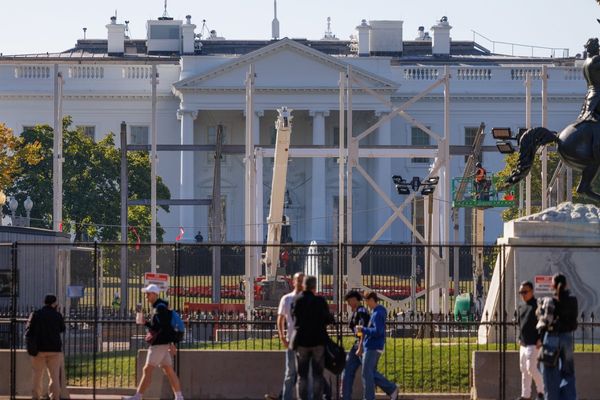WASHINGTON _ Reps. Jeff Denham and Devin Nunes say they're farmers, and that's how they're going to be described on this fall's California election ballots.
But are they farmers?
Democrats say no, and they're trying to stop them from labeling themselves that way. The party is mounting legal challenges to California Republicans in the San Joaquin Valley over their using the word "farmer."
Farmer is a popular ballot description among those representing the San Joaquin Valley, used by Denham, Nunes, Rep. David Valadao, a Republican, and Rep. Jim Costa, a Democrat. Democrat groups want to force Denham and Nunes to take that description off the ballot.
California's election code allows candidates to include a three-word description of their "current principal professions, vocations, or occupations," or one they held in the previous year, beneath their name on the ballot.
The "ballot designation," as it is known, is a constant source of dispute in election years. Both academic research and anecdotal evidence indicate that a candidate's description on the ballot can affect support, particularly in races where voters know little else about the candidates.
As a result, campaigns and political consultants try to figure out the description that will most appeal to local voters.
Before the state's June primary, more than a half-dozen congressional and statewide candidates were forced to amend their designation after being denied their first choice by California's secretary of state or because of an opponent's court challenge.
Red to Blue, a Democratic program designed to flip Republican House seats, filed a lawsuit against Denham Tuesday, saying he isn't truly a farmer because he leases his 20 acres of almond orchards in Atwater. The income he earns from the land, valued at minimum $500,000, is in rent and not listed as farm income on his 2018 financial disclosure report.
The lawsuit, filed in Sacramento County Superior Court, calls for Democratic California Secretary of State Alex Padilla, who approved the "Businessman/Farmer/Representative" designation in March, to remove the description on the November ballot.
The majority of Denham's overall income, besides his congressional salary, comes from renting a property in Turlock and from his plastics company based in Salinas.
Denham said the plastics company also makes farming equipment, adding to the income that comes from his involvement in agriculture.
Calling the lawsuit "ridiculous" and "an attempted distraction to not talk about water issues," he said he grew up farming a wide variety of produce, from corn to watermelon. He also bought the farmland 15 years ago and worked on it personally with his children, he said.
"I bought the land as a sweet potato farm, and my kids helped me pull it out and plant almond trees," Denham told McClatchy. "They grew up on it."
He said he leased it seven years ago when he started coming to Washington.
It's not the first time Denham has been criticized over the issue. A former congressional opponent, Michael Eggman, put "Real Local Farmer" atop many of his campaign signs, to contrast himself with Denham. More recently, at a public appearance last week, some protesters chanted "fake farmer" at Denham.
Nunes is facing a similar challenge, with Democratic Super PAC Fight Back California funding a challenge in court that would force the congressman to remove the farmer designation. While Nunes' most recent financial disclosure reports less than $5,000 in income from Alpha Omega Winery and less than $200 from a Bank of America Savings Account, his family owns a farm in Tulare.
The lawsuit says Nunes has not "earned income from farming or agriculture operations in at least 10 years."
Anthony Ratekin, Nunes' chief of staff, did not respond to a question regarding how Nunes received farm income, but sent McClatchy a statement saying, "I'm sure the left-wing activist groups that sponsor these stunts are thrilled they can continue to depend on McClatchy and the Fresno Bee to obediently report their talking points."
What defines a farmer isn't clear-cut. Under the California Farm Bureau bylaws, it seems to come down to how much income comes from farming activities, which can include leasing farming land to others.
"A person qualifies as an agricultural member if he or she 'derives a substantial portion of his or her gross income from farming operations _ including as an owner, lessor, lessee, manager, officer or substantial shareholder' of a farming enterprise," said Dave Kranz, spokesman for the California Farm Bureau Federation.
"I don't see anything in our bylaws that defines what 'substantial' means exactly," he added. "Local farm bureaus make those determinations, so you'd have to ask them."
The Merced County Farm Bureau, which would have jurisdiction over Denham's farm's location in Atwater, did not return a request for comment. The U.S. Department of Agriculture has a definition for what constitutes a farm but not a farmer.
Denham said he earns $50,000 per year in rent on the property now. He was unable to say how much that comprised of his total annual income. It could be anywhere from 4 percent to 13 percent of his income, according to his financial disclosure report, which only gives ranges on income and not definite amounts.
If Nunes counts the winery as a farming operation, it accounts for 2.8 percent of his income at most. He did not report any personal income from the family farm on his latest financial disclosure.
They aren't the first people to face suits over the farmer designation on the ballot. In a race for a state Assembly seat in 2016, one Republican candidate successfully persuaded a judge to force another Republican candidate to remove their farmer description from the ballot.
Republican candidate Young Kim is also facing a challenge to her ballot designation, as a "small business owner," in the race to replace retiring Republican Rep. Ed Royce in Orange County.
Neither Valadao nor Costa are being challenged on the farmer designation. Both report significant earnings in "farm income" on their financial disclosure reports.







